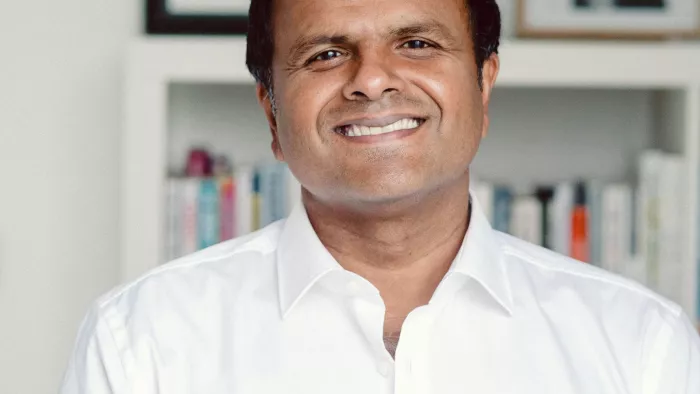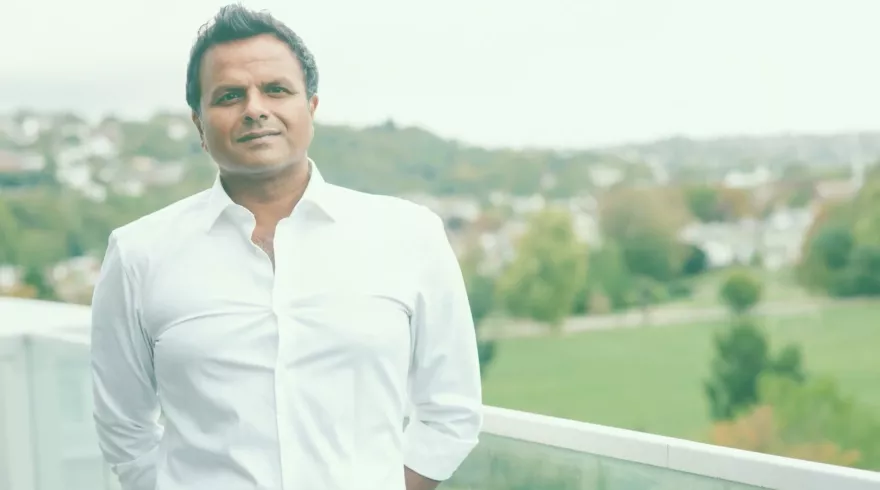
Change maker: Collective innovation
Ben Ramalingam, Overseas Development Institute / UK (London)
My name is Ben Ramalingam and I am a senior research associate at the Overseas Development Institute in London. I am based in Brighton in the UK and I am a change maker for collective innovation.
Even to be nominated was an honour and to be selected as one of the ten change makers for the last decade is, well, I’m surprised and delighted and honoured.
My first experience of humanitarian crisis was living through one. I grew up in Sri Lanka during the civil war, I lived in a country that to me, seemed like paradise. It was full of family members and laughter and I had a dog but obviously there were a lot of things going on [in the background of that].
I was eight years old when the civil war kicked off and obviously there were tensions that were building which I wasn’t witness to because I was protected from them. It was in May, 1983 that this civil war exploded into my life and at the time, it really did feel like an explosion. Suddenly, there was fire and bombs, there were stories in the news the whole time, there were scary stories the kids were telling each other at school. Whenever you walked into a room with the grownups, suddenly someone would be turning the radio off because there was something bad happening.
Slowly, it started to get closer and closer and eventually, we were in the position of having to flee our home several times because of - I don’t know who they were, I was just told bad people were coming - they wanted to attack, set fire to our homes or set fire to us. So, for a period of about eight, nine months, we lived through this uncertainty of the civil war and I think that really did shape me because when we eventually left Sri Lanka, we were fortunate enough to find refuge in the UK.
My mum was a pharmacist in Sri Lanka and she was able to find work as a pharmacist in the NHS. I am not saying things were easy for us, the echoes, the impact of war echoes on for us in our lives, emotionally, physically. It echoes on in terms of the sense of displacement we have, family members got displaced and fragmented in many different placed, but I was really aware that I was lucky and it came home clearly to me when I was a young man.
I was in my 20s and I went travelling to India, with one other friend, and I met people who had left Sri Lanka the same year I had, fifteen years earlier and they were still living in tin huts. They were still illegal immigrants - refugees - and they had a really terrible existence. They struggled to find work, they were ostracised, they were seen as below caste system. I think it was that moment that made me realise how lucky I had been to have escaped the war, relatively intact. That I was in a position unlike many other people who had left and even though, for example, I had family members who had died, there were many in the wider community who didn’t have the same opportunities [I had].
I felt like I had to be able to use this good luck in a positive way, I had to channel it. It wasn’t enough just to make money or going into to the city, I wanted to work in the humanitarian sector. That was the moment. I think at that moment, that experience still drives me, and I think it still underpins many of my fundamental beliefs about the humanitarian sector, about what it is today and how it should change.
I think it also underpins my ideas about innovation that if we are all going to be providing assistance to people who are affected by crises, we should be making sure that it is a humanitarian imperative to be as creative and as impactful as possible. We shouldn’t be relying on approaches that were designed in the 19th century and perfected in the 20th. We should be making them more appropriate to the lives of the people we are trying to serve.
So, a lot of my beliefs, I believe strongly in localisation and I think that also stems a lot and there are other sources for that belief as well makes practical experience in humanitarian assistance, my work with many southern and local NGOs but I think it also stems from the fact that I lived through a crisis and I saw how people reacted and the international community for sure played a role but it was family members, it was the community and it was the local that was central and that’s the way it always is. It expands later but it is always just the reality of people living through the crisis. So, let’s be honest about that and let’s make that part as good as it can be. Let’s not be too arrogant about what it is that we do.
[Recently] I have been advising the OECD DAC on how to strengthen innovation in the age of COVID. We have done a lot of operational work on different kinds of innovation and what we found is that, in the wake of COVID, the kinds of innovation that were seen tend to be either small scale kind of adaptation to what’s already going on. So, incremental innovations or technological innovations but there is a real gap in terms of engaging bottom-up innovations, those coming from communities themselves. There is a real gap in terms of forward looking innovations and looking up to the future and there are some mission-driven innovations, looking into the big picture challenges and the most obvious ones are vaccines invented but there is a need for more.
I feel like we need to move away from innovation management to innovation leadership. And innovation leadership is not saying, how do we do innovation right? It’s asking the question, what are the right innovations to be doing? What should we be focusing our attention on? This is something I feel should happen within the sector in a more central way and innovation needs to be seen as a core leadership competency for the next 10 years. If CEOs or operations directors do not have innovation in their mindset, I think that should be seen as a real critical gap.
The second area where I would really want to see more change and this is the harder one really, is in the role and position of disaster-affected communities and again, it speaks to the innovation space because all of the most transformative innovations we have seen in the last 10 years of the Start Network, I mean, even before that, all of them have come about because of a shift in how aid organisation see affected communities. Specifically, moving away from seeing them as helpless victims to being entrepreneurs, to being capable individuals, communities that lead their own recovery.
It’s a real honour to be named a change maker but I fundamentally believe that everyone I’ve met in the humanitarian sector is a change maker. No one has a monopoly on change, change is fundamentally a democratic process. Let’s all make change happen.
This article is based on an interview conducted by A Good Day in Africa.

